Roberto Di Matteo: I got rejected by Birmingham? Don't believe everything you read...
FourFourTwo sat down for a career reflective with the incoming Aston Villa boss in our April 2014 issue...

Roberto Di Matteo is enjoying being at home in south London. "When I worked, I would get up and leave before the three kids woke up and then get back in the evening," he says as his English wife makes FourFourTwo an espresso.
Even if I was tee total, I would have still drunk alcohol that night in Munich
"It was hard on my family," adds the former Schaffhausen, Zurich, Aarau, Lazio and Chelsea player who was capped 34 times by Italy. "So it was really nice to spend a summer holiday with them and to see so much of them now."
As planes roar ahead on the Heathrow approach, Di Matteo talks about his past as a player and manager at MK Dons, West Brom and Chelsea, where he became the first manager to win the European Cup in Europe's biggest city. "Even if I was tee total, I would have still drunk alcohol that night in Munich," he smiles, recalling a night of celebrations "singing and dancing, trying to understand the moment while also being so tired."
"I wanted to stop the clock," he adds. "My players wanted to throw me in the swimming pool at five in the morning, when it was getting light. Well, Drogba did. He called me over for a chat. I thought it would be about his future, but he picked me up and threw me in."
The best features, fun and footballing quizzes, straight to your inbox every week.
What was it like working as a butcher for a brief time? It’s not the kind of job most teenagers do! Did you get any free sausages?
Peter Niblett, via email
You need to understand the background. In your final year at school in Switzerland you need to do an apprenticeship. You have two weeks work experience and they try to understand which way you want to go. I did different apprenticeships. I was a baker, a mechanic and a butcher. I did loads and quite enjoyed them, but none of them were for me.
You were born in Switzerland but are of Italian heritage and have lived in England for a while now. Where do you consider home?
Steve Hughes, London
I consider home to be wherever I am with my family: my wife and my children. I've been influenced by the Swiss culture, by my Italian culture, by the English culture. I feel like a pan-European man because of the influence of all these cultures. The Swiss culture is based on education, both social and academic. They have respect for the nation, for the people. They are efficient and punctual. That is inside me. The Italian culture is about enjoying your life and being optimistic about your life. It's about looking after your family. I feel that. The English culture has taught be to be open minded about the world. The English were conquerors in the past. They like to travel and see the world. I've lived in London most of my time. It's a cosmopolitan city where I've learned to accept many different religious styles of living. I've accepted the idea of living with people with different ideas and philosophies.
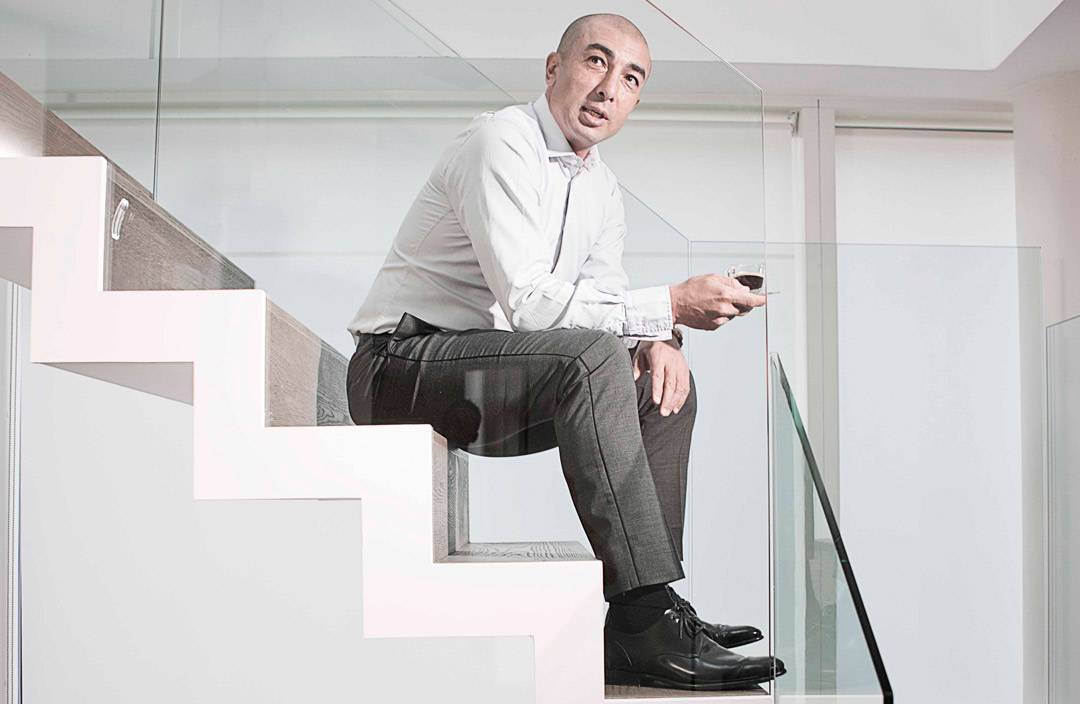
What was the quality of the Swiss league like when you played there? Who was the best player you played with?
Ian McIntosh, Glasgow
Back in the '80s the Swiss league wasn't as good as it is now. It has improved exponentially in the last 10 years. It was average then compared to other European leagues. There were some good players and others who came to play at the end of their career like Marco Tardelli. Football wasn't as important as it is now. It was the No.1 sport with ice hockey, but football has grown in popularity and there are Swiss players now playing in major European leagues. The infrastructure is better after 2008 too. The best player I played with was a Polish guy called Ryszard Komornicki. He was a creative midfield player and we played in a title-winning team together at Aarau.
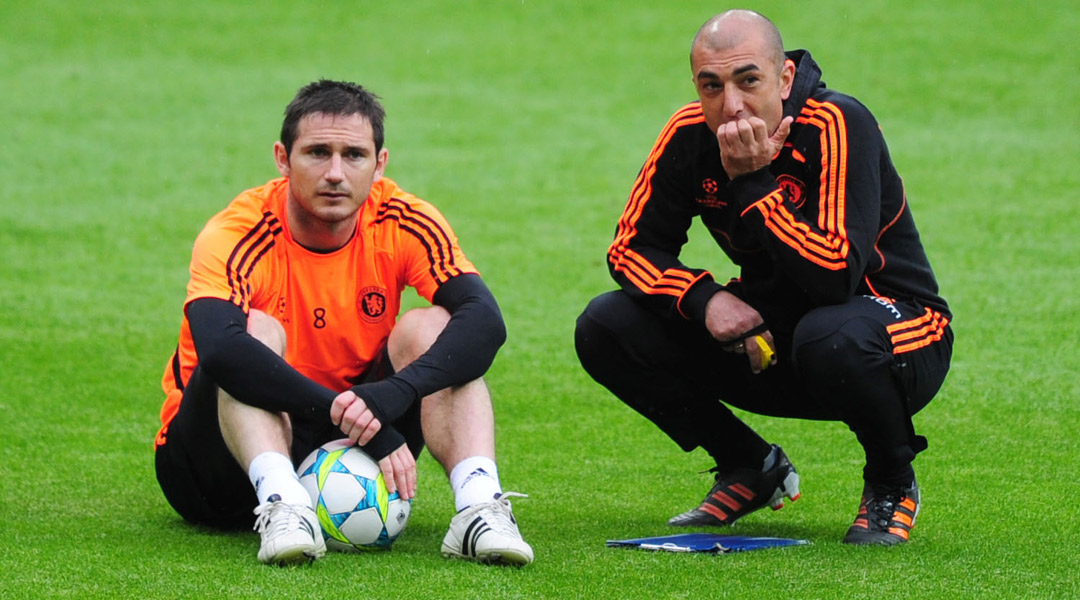
You could have played for Switzerland or Italy. Why did you choose the Azzurri?
Duncan M, London
There wasn't a decision to play for one of another. I was living and playing in Switzerland and could have gone for the Swiss nationality which could have made me available for selection for the Swiss team. People recommended that it would further my career as I was a foreigner on the squad list. I didn't believe in that. I saw it as a challenge to prove that I was good enough as a foreigner to play in any team. It gave me a motivation to prove to myself and others that I could be in the team and have one of the sacred foreigner spots. I could have taken an easier road and become Swiss. The Italian national team weren't in the picture at that time. That was a dream, a long shot. I wanted to one day play in Italy as a professional.
Can you describe the atmosphere for the Rome derby? Does anything in football match it?
Marco, via email
When I watched a Rome derby this season, I noticed that the stadium wasn't full. That surprised me. The atmosphere is incredible there.
As a player I loved to play it because you come out into a full stadium, where you have two sets of supporters with their flags and songs. There would be 60,000 home fans, 20,000 away fans. They were high-pressure games and from the first day I signed for Lazio all everybody talked about was the derby. Win the derby and everything else was OK. It was superficial, I suppose, but it was a wonderful experience. I played in six Rome derbies and won three, drew two and lost one.
Is it true you had a spectacular falling-out with coach Zdenek Zeman that led to him booting you out of Lazio? What was it about?
Mario Lombardi, Sardinia
It's not quite true. That's the perception that the media gave. I had a good relationship with him. Sometimes we had discussions where we agreed and disagreed, which was normal. I always respected his decision. After three very happy years at Lazio, I thought that a new personal and professional challenge would be a good idea. That was the main reason I left, not the coach. On the other hand, the club was also happy to sell me when they received the offer from Chelsea.
Is it right that your car got trashed and fans rioted when Lazio sold you to Chelsea in 1996? Nice motor, was it?
Ewan Smith, Perth
You shouldn't generalise. There were a small number of fans who showed their unhappiness at me leaving. They didn't trash my car, but they did confront me outside the headquarters of Lazio. It wasn't exactly nice, I have to say. But after I spoke to them and gave my reasons, everything was settled.
What inspired that awesome goal celebration when you scored on your Chelsea home debut against Middlesbrough? Go on, Robbie, recreate it for the FFT cameras!
Luke Watmore, Kensington
(Smiles) It wasn't planned at all. I wasn't a striker and didn't expect to score. It was just a reaction to scoring my first goal in the first home game at my new club. It started our season and remains a happy memory.
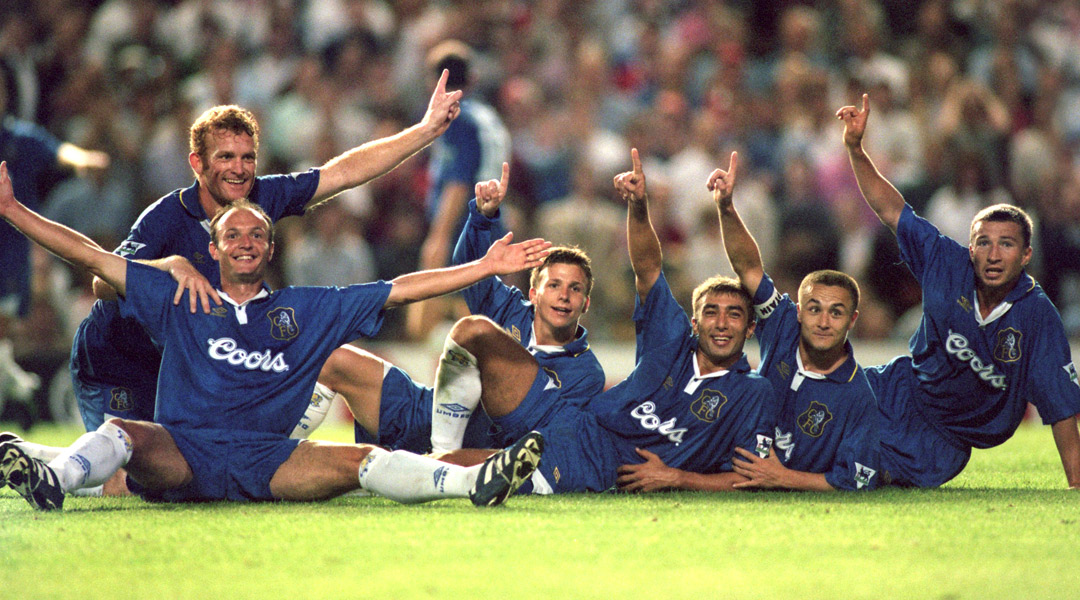
The old Wembley was lucky for me. I also played for Italy there and we won as well
Three Wembley cup finals for Chelsea and you scored in all of them. Bet you were gutted when they ripped the Twin Towers down! I’ve got one of the old stadium’s chairs – want to buy it off me?
Jake, via email
Jake's right, the old Wembley was lucky for me. I also played for Italy there and we won as well. Life moves on and the new Wembley is a wonderful venue. I've watched a lot of games there.
I wish I could have played in it because it's probably the best stadium in the world. As for the chair, I've probably got enough in my house, but thanks for the offer.
When Louis Saha scored after 25 seconds of the 2009 FA Cup Final, was your first thought about your old club being behind or your Wembley record being pinched?
Jake Adams, Melbourne, Australia
I knew that someday someone would better my record. The only thing I didn't appreciate was that the goal was scored against Chelsea.
How different was pre-Abramovich Chelsea to the club we see today?
Alain Ferrari, Zurich, Switzerland
It had more of a family feel pre-Abramovich. There was a personal connection to Ken Bates, he would be very involved with the players. He was a generous man, which not many people know. He's ruthless if he wants to be, but I think there's the wrong perception of him in the media. The club was smaller too and you had a personal relationship with a lot of the staff there. Chelsea was a good domestic club, average in Europe, even though we won the Cup Winners' Cup. We reached the quarter-finals of the Champions League but never had quite enough to be a challenger to win the trophy. With Abramovich the club moved up a level. It became a domestic and international force. It's probably a bit more corporate run too.
Dennis Wise: is he the nutter everyone says he is? How did he compare to Gazza at Lazio?
Terry Toms, via email
Wisey is crazy in a good way. He's a good friend and we keep in touch. We've spent a lot of our life together. He was a good captain, very fair in that he put emphasis on the squad, not only the important players. He was crazy on the pitch though. He'd drive the opposition nuts by winding them up. He got Nicky Butt sent off. He wound opponents up so much. He'd talk, he'd pinch them. It was great to have him in your team.
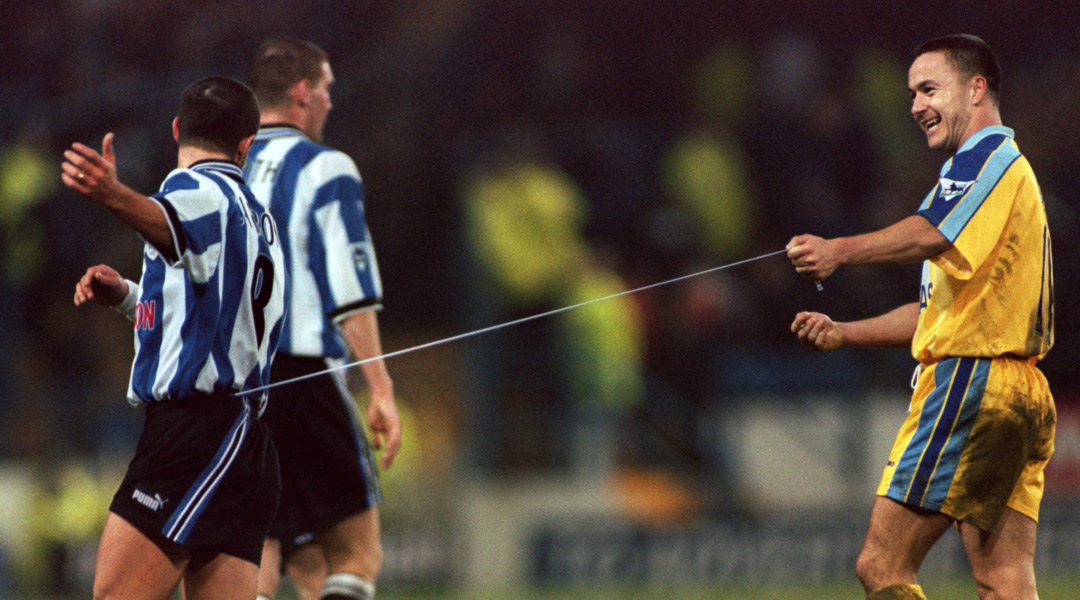
Gazza's behaviour could be funny and also unusual at Lazio, but you could see that there may be issues in the future. He was the funny guy in the dressing room and he'd keep spirits high. He would fool around. You'd put your shoes on and they'd slip into cream or toothpaste which Gazza had put there. Or you'd go to your car after training and all four of your car tyres would be flat because Gazza had let them down. He was very popular with Lazio supporters. He was a likeable man. You couldn't get angry with him, even when he'd let your tyres down, because he'd just laugh at you. Gazza was an exceptional player; he scored some spectacular individual goals. His Italian was not quite so exceptional, though. He tried to speak a little bit and he could understand more than he could speak, but he had a very strong accent, a kind of Geordie/Italian. I couldn't understand his English either!
He had a very strong accent, a kind of Geordie/Italian. I couldn't understand his English either!
I'll never forget you breaking your leg against St Gallen in 2000. Did you think you'd never play again? And how did you react when your worst fears were confirmed?
Adam Jones, Fulham
I was devastated when it happened, but I didn't think I'd never play again. It had happened to other people before, but as the day went on I had complication after complication.
Four or five days after the injury, I was in a bad way. The surgeon said to me: 'Look, Rob, we have to make sure that you will have a normal life, which means you being able to walk normally, before we even think about you playing again'. That was when it hit me.
Then he explained the complications and I thought 'I'm in trouble now'. There were difficult times in the months ahead. I had a triple fracture with compartment syndrome - internal bleeding inside muscles. That creates a lot of pressure, which needs to be released. If it is not you lose the muscle. They had to slice me open to find the artery or vein which was bleeding into the muscle compartment. I had other complications like infections. It seemed like there was a new problem every day, a new complication. I remember thinking: 'Four days ago I was a professional footballer; today I'm looking at being disabled for the rest of my life'.
Do you think you’d have won more caps for Italy if you hadn’t moved abroad?
Paolo, via email
Yes. For sure. When I left I knew it would affect my chances for Italy. It did. It did the same for Gianfranco Zola, Fabrizio Ravanelli and Pierluigi Casiraghi. If you left Italy, you left the Italian national team. Why, I don't know.
Was it frustrating to watch Italy's World Cup '98 defeat to France on penalties from the bench, especially in hindsight, as you wouldn't play for them again? Would you have stepped up to take one if you'd been on the pitch?
Sean Lyon, Derby
I was not a penalty taker so probably not, I wouldn't have been appointed. It was hard seeing your team-mates working, but against France in France? That was tough, it felt like France were playing a home game. I remember the extra motivation Italy had in 1990. We did well to reach the quarter-finals and take the eventual winners to the lottery of penalties.
Why did you decide to come back to football after completing a Master’s degree in Business Administration?
Michael Davies, via Twitter
I did a BA diploma in Switzerland. After I finished my career I wanted to go back into academic education because I hadn't done any throughout my football career. That comes from the background of having being raised inn Switzerland, where the focus is academic education. I also like to study, to focus and learn new things. So I went to the European School of Economics in London and it was of great value to me. The subjects were interesting like strategic management and operational management. It's more corporate than sport focused. The psychology was interesting too. I liked the environment of being challenged intellectually and enjoyed it. It was hard, studying from morning until evening in English, which is not my mother language, but I'm glad I did it.
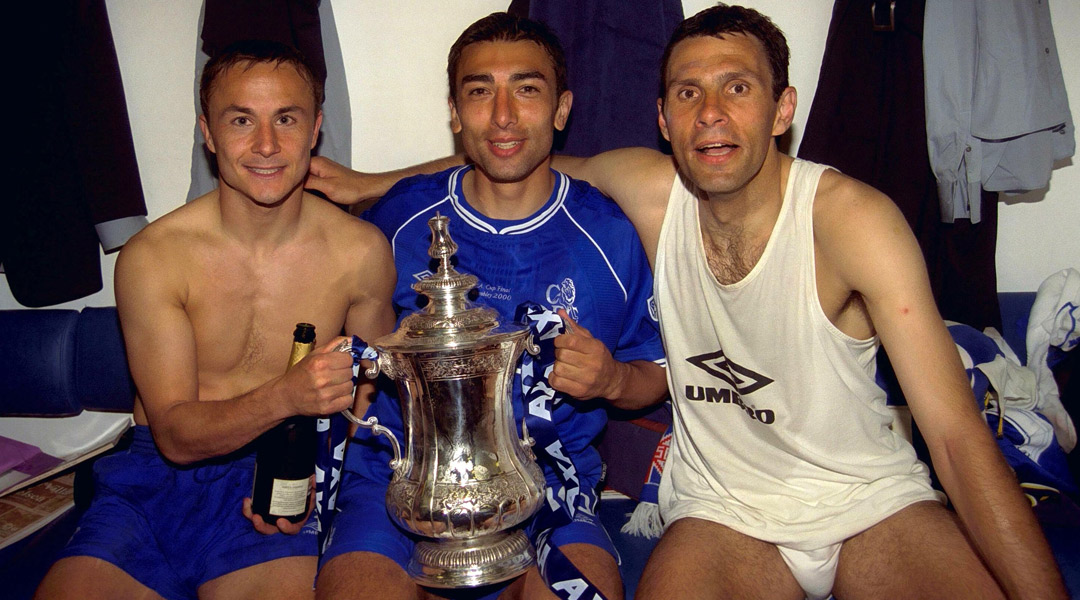
MK Dons aren’t a popular club among neutrals. Did you understand that when you joined them – and did you care?
Martin Richards, Manchester
Did I understand it? No. Did I care? No. Did I have a great time there? Yes. We had an average attendance of 10,500 in League One. There was a lot of optimism and enthusiasm and Pete Winkleman was a wonderful chairman, his wife a wonderful lady too. The stadium was great and Milton Keynes is actually a nice place with a great location. I was lucky for that to be my first position as a manager. When we travelled to away games there was no recognition of our unpopularity. We were just a normal away team.
You brought Tore André Flo out of retirement at Milton Keynes. Did he take a lot of convincing? And was it hard to see your former team-mate miss a penalty to stop the Dons going to Wembley for the play-off final?
Thomas Rees, Milton Keynes
He took a bit of convincing because he had retired, but it worked out for him. He could stay at home and commute. He knew me and Eddie Newton too, which helped. Yes, he missed the penalty, but that could have happened to anybody. We had the chance to win the penalties twice before Tore missed. It was a shame because we deserved a little better.
At West Bromwich Albion, did you have any doubts about welcoming back Roman Bednar after his police caution for drug possession?
Lee Ryan, Birmingham
He had been punished. You hope that people learn from their mistakes and I felt he deserved another chance.
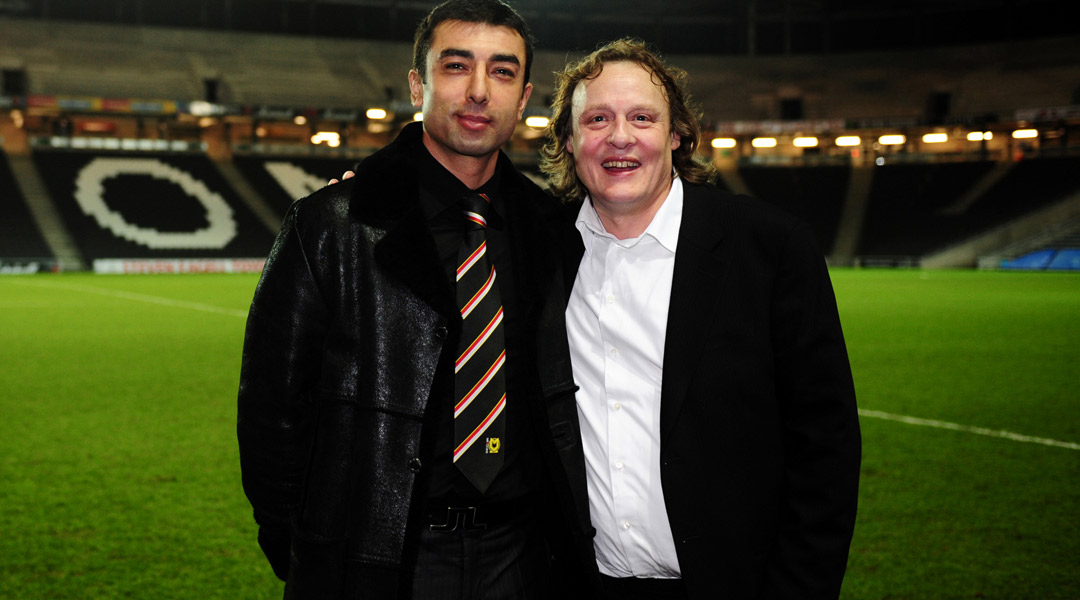
How do you look back on your time with West Brom? Promotion, Manager of the Month, then fired halfway through your first Premier League season. Was that harsh?
Alex Mitchum, Cork
I've been in football for so long that nothing really surprises me. I guess they felt it was right for the club. It was a blessing in disguise for me because if they hadn't sacked me I would still be there and wouldn't have achieved what I've achieved today. West Brom was a good experience. We bounced back into the Premier League after a great season. We started well in the Premier League and didn't spend a day in the relegation zone. That's football, that's life.
I heard you were rejected by Birmingham City after they were relegated. What happened? You should have been a shoo-in!
Roy Alton, Birmingham
Don't believe everything that you read because that's not true.
I see you live in Leamington Spa. Ever been to the pump rooms? Rubbish, aren’t they?
Simon, via email
I spent some years living in Leamington Spa and liked it very much. It's a lovely town. There are many beautiful places in England, like Cornwall. My kids have just been to the Lake District and said very positive things about it. But no, I've never been to the pump rooms. Maybe in the future.
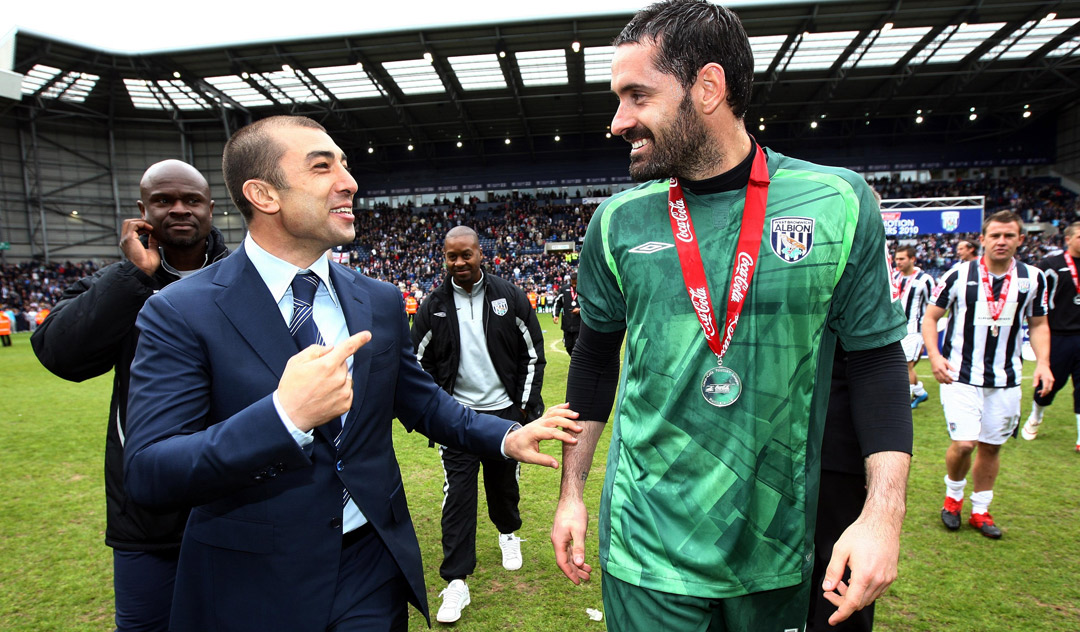
Rumours circulated during Andre Villas-Boas’ Chelsea reign, when you were his assistant, that the so-called ‘old guard’ undermined him. Was there any truth in that?
Tony Smith, Carlisle
No. The club felt it was time for a change. But I hope you also understand that it's difficult for me to speak about this.
What did you make of Pep Guardiola saying, after the first leg against Barcelona, “It’s never easy to play well when the opposition is not playing football”? Was it disappointing to hear your opposite number react so negatively to a tactical battle?
‘Sugar Ray’, via email
That's not what he said to me after the game, when we had a very good conversation and he complimented our plan, if not our style. I have a high regard for Pep Guardiola as a coach and a manager. I'm very impressed that he learned German too. But after the games against Chelsea, he realised that we had our game plan, which was perfect for the players we had available. It worked perfectly and Pep respected that. Maybe the disappointment of losing the game made him say those things, but I'm not even sure he said those things because he's very objective and humble. (Di Matteo is correct; he didn't say it in 2012. Though Guardiola did say it in 2009 after Barça vs Chelsea).
I spent some years living in Leamington Spa and liked it very much. It's a lovely town
Who was next in line to take a penalty in Munich? Is it true you asked Fernando Torres but he said he didn't want to? Also, were you under pressure from above to play him?
Tim Leigh, Stoke
I'm not going to disclose who was going to be the sixth penalty taker. And I was under no pressure to play or not play somebody.
What did you say to Roman Abramovich in Munich when you passed him on the steps after the game and grabbed him by the head? I’ve always wondered...
Charlie Ghagan, Staines
"We did it". He was very happy. I think he laughed.
Did any of the players take the mickey out of John Terry for his shin pads shenanigans in the Champions League celebrations?
Gary Potter, Cornwall
Not as far as I know. It was part of the celebrations.
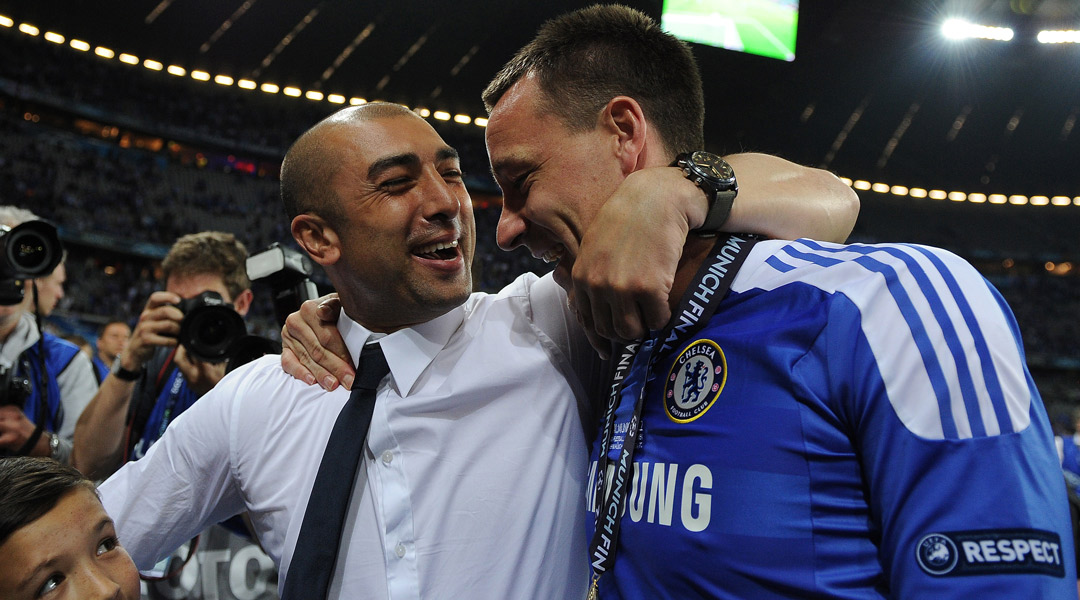
Which spell at Chelsea did you enjoy more - your spell as a player or your spell as a manager?
Tom Rust, via Twitter
Nothing will ever replace the emotions you feel as a player, when you are directly involved on the pitch. You can make a result by scoring a goal, saving one or setting one up. Being a manager is completely different. You have a strategy, which you then have to let go to the players’ feet and heads. I had a great time as a player and a manager at Chelsea. The connection with the people and fans was special and we enjoyed a lot of success.
What now, Roberto? Would you consider managing in Italy?
Tim Doel, via Twitter
I'm open minded about my next project. I don't know what it is going to be. We'll see what the future holds. I'm blessed with languages - I speak German, English and Italian. I can get by in a couple of other languages. I'm taking a break this year and I've enjoyed that. When I work I get very involved.
Our One-on-One with Roberto originally featured in the April 2014 issue of FourFourTwo. Find loads more here.

Andy Mitten has interviewed the likes of Lionel Messi, Eric Cantona, Sir Alex Ferguson and Diego Maradona for FourFourTwo magazine. He also founded and is editor of United We Stand, the Manchester United fanzine, and contributes to a number of publications, including GQ, the BBC and The Athletic.
 Join The Club
Join The Club





